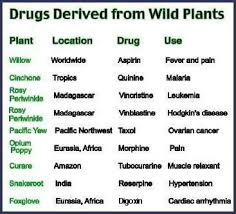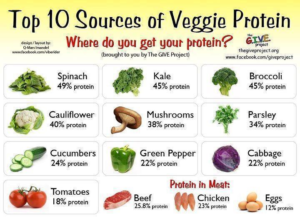

Ginger:
Ginger is one spice that I recommend keeping on hand in your kitchen at all times. Not only is it a wonderful addition to your cooking (especially paired with garlic) but it also has enough medical properties to fill several books.
Ginger is best known for its anti-nausea effects but also has broad-spectrum antibacterial, antiviral, antioxidant, and anti-parasitic properties, to name just several of its more than 40 scientifically confirmed pharmacological actions. It is anti-inflammatory, making it valuable for pain relief for joint pain, menstrual pain, headaches, and more.
The pain-relieving potential of ginger appears to be far-reaching. Along with help for muscle and joint pain, ginger has been found to reduce the severity of migraine headaches as well as the migraine medication Sumatriptan – with fewer side effects.
Ginger also shows promise for fighting cancer, diabetes, non-alcoholic fatty liver disease, asthma, bacterial and fungal infections, and it is one of the best natural remedies available for motion sickness or nausea (from pregnancy or chemotherapy, for example).
Taking one gram of ginger daily may help reduce nausea and vomiting in pregnant women, or those with migraines and ginger has been shown to work better than a placebo in relieving morning sickness.
Ginger is also a must-have if you struggle with indigestion, and it does more than simply relieve pain. Ginger contains powerful protein-digesting enzymes and helps to stimulate the emptying of your stomach without any negative effect, and it’s an antispasmodic agent, which may explain its beneficial effects on your intestinal tract.
Many people enjoy ginger tea on a regular basis, and this is one of the simplest ways to use it. Simply chop off a couple of inches of ginger root and let it steep in hot water for fresh ginger tea. I would advise against using it daily as it can lead to an allergy and is what happened to me about twenty years ago.
You can also peel the root using a paring knife and then slice it thinly (or grate it or mince it) to add to tea or cooked dishes. You can’t go wrong by adding ginger to stir fries or even your favorite homemade chicken soup. For serious issues, a natural health care provider can help you get the maximum therapeutic benefits of ginger.
Garlic:
Eating a clove or two of fresh garlic a day may indeed keep the doctor away, in part because it has immune-boosting, antibacterial, antiviral, and anti-fungal effects. Many of garlic’s therapeutic effects are derived from its sulfur-containing compounds, such as allicin, which are also what give it its characteristic smell. In general, garlic’s benefits fall into four main categories:
-Reducing inflammation (reduces the risk of osteoarthritis and other disease associated with inflammation).
-Boosting immune function (antibacterial, antifungal, antiviral, and antiparasitic properties).
-Improving cardiovascular health and circulation (protects against clotting, retards plaque, improves lipids, and reduces blood pressure).
-Toxic to at least 14 kinds of cancer cells (including brain, lung, breast, gastric, and pancreatic).
In addition, garlic may be effective against drug-resistant bacteria, and research has revealed that as allicin digests in your body, it produces sulfenic acid, a compound that reacts with dangerous free radicals faster than any other known compound. This is one of the reasons in my article garlic what listed as one of the top seven anti-aging foods you can consume.
In order to get the health benefits, the fresh clove must be crushed or chopped in order to stimulate the release of an enzyme called alliinase, which in turn catalyzes the formation of allicin.
Allicin, in turn, rapidly breaks down to form a number of different organosulfur compounds. So to “activate” garlic’s medicinal properties, compress a fresh clove with a spoon prior to swallowing it, or put it through your juicer to add to your vegetable juice.
A single medium-size clove or two is usually sufficient and is well-tolerated by most people. The active ingredient, allicin, is destroyed within one hour of smashing the garlic, so garlic pills are virtually worthless. Black garlic, which is basically fermented garlic, and sprouted garlic may contain even more antioxidants than regular garlic.
Peppermint:
Peppermint offers benefits to the respiratory system, including for coughs, colds, asthma, allergies, and tuberculosis. In terms of digestive health, peppermint oil capsules have been described as “the drug of first choice” in IBS patients, and peppermint oil is an effective alternative to drugs like Buscopan for reducing colonic spasms.
It may also relax the muscles of your intestines, allowing gas to pass and easing abdominal pain. Try peppermint oil or leaves added to tea for gas relief. Inhaling the peppermint aroma may offer memory enhancement and stress relief, and peppermint oil acts as an expectorant and decongestant, and may help clear your respiratory tract.
Use peppermint essential oil as a cold rub on your chest or inhale it through a vaporizer to help clear nasal congestion and relieve cough and cold symptoms. Peppermint oil may also help relieve tension headache pain. For headache pain, try dabbing a few drops on your wrist or sprinkling a few drops on a cloth, then inhaling the aroma. You can also massage the oil directly onto your temples and forehead. Peppermint essential oil is ideal for muscle and chest rubs, headache pain, dental care, and aromatherapy. You can even add it to your homemade cleaning supplies for extra antimicrobial power and natural fragrance.
When selecting peppermint for your own use, the fresh leaves will impart a superior flavor to dried leaves (such as for use in tea). Look for fresh leaves that are green in color without any dark spots or yellowing. In addition to using fresh mint leaves in tea, you can add them to soups, fruit salad, or gazpacho. Additionally, it is really easy to grow peppermint yourself and the plant works as a highly effective deterrent to many insects that might invade your garden or your home.

